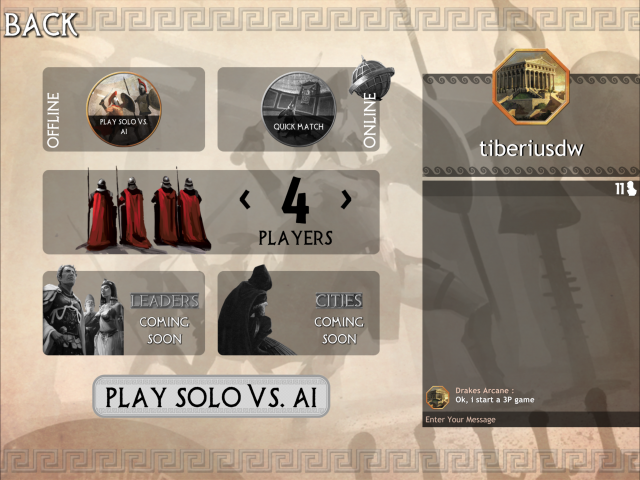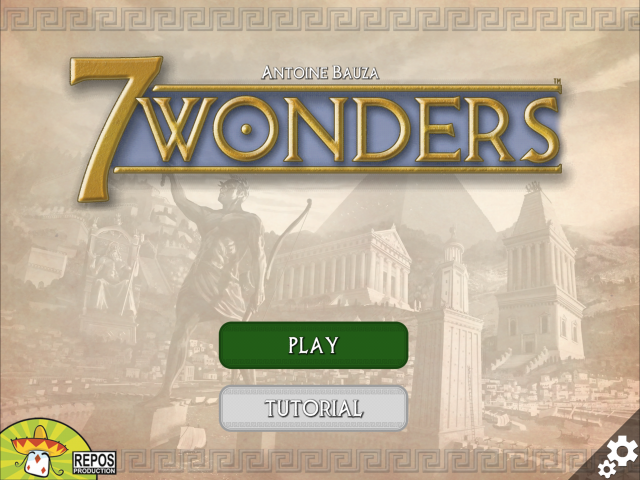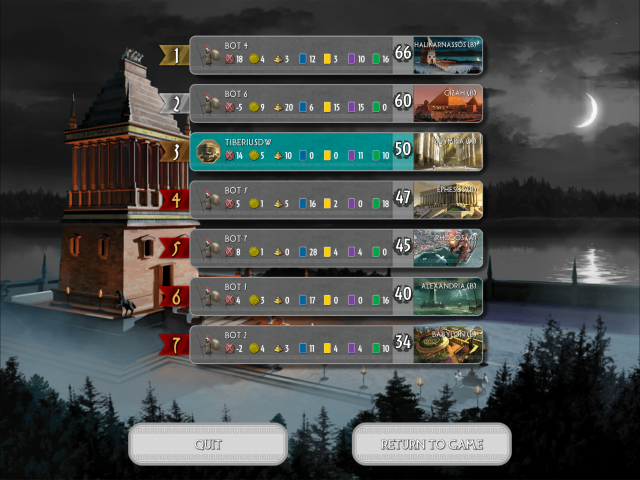On the occasion of the long-awaited (and much-memed within the BGG community) arrival of its digital port, I figure this is as good excuse as any to revisit 7 Wonders, by Antoine Bauza.
 Previous to 7 Wonders’ release in 2010, Bauza was best-known for a variety of very good and quite different games, including Ghost Stories, Hanabi, and Takenoko, which shared Asian-related themes but little else. 7 Wonders shifted focus to the Ancient Mediterranean and combined drafting and tableau-building mechanics in an easy-to-digest format.
Previous to 7 Wonders’ release in 2010, Bauza was best-known for a variety of very good and quite different games, including Ghost Stories, Hanabi, and Takenoko, which shared Asian-related themes but little else. 7 Wonders shifted focus to the Ancient Mediterranean and combined drafting and tableau-building mechanics in an easy-to-digest format.
Each player represents a city of the ancient world (Giza, Ephesos, Halikarnassus, etc.) with a different initial resource and the potential to build a Wonder. Building each stage of the Wonder produces a different reward–some combination of cash, VP, military might, or a miscellaneous ability. Each Wonder’s rewards are different. Your job is to build up your city’s productive, commercial, scientific, cultural, and military capabilities over the course of three Ages.
 During each Age you and your opponents pass around and draft cards representing buildings, playing them into a personal tableau. Each Age has its own deck, the cards get more and more powerful and point-rich with each Age. In between Ages play pauses briefly for a Conflict interphase where each player compares her strength to each of her immediate neighbours. Victories are worth VP (more each Age); losses incur a 1 VP penalty.
During each Age you and your opponents pass around and draft cards representing buildings, playing them into a personal tableau. Each Age has its own deck, the cards get more and more powerful and point-rich with each Age. In between Ages play pauses briefly for a Conflict interphase where each player compares her strength to each of her immediate neighbours. Victories are worth VP (more each Age); losses incur a 1 VP penalty.
At the end of Age III VP’s are totalled. Aside from military victories players can gain VP in the following areas:
There are many paths to victory, but 7 Wonders is a game where you really must pay attention to what your neighbours are doing, for several reasons:
 The richness and variability of the game scales extremely well from 3 to 7, and since card choice is simultaneous, the length of a game depends more on the decision time of the slowest player than anything else. The base game contains rules for 2 players, but since the release of 7 Wonders Duel couples have a much better option available.
The richness and variability of the game scales extremely well from 3 to 7, and since card choice is simultaneous, the length of a game depends more on the decision time of the slowest player than anything else. The base game contains rules for 2 players, but since the release of 7 Wonders Duel couples have a much better option available.
There have been three major expansions for 7 Wonders which can be added individually or in any combination:
Leaders unsurprisingly adds Leader cards, which are drafted before Age I begins; each leader has a cost (players begin with more money as compensation) and a special ability. Before the start of each Age players simultaneously pick and play one of their Great People. Leaders adds little to complexity but considerably to the game’s depth.
Cities adds Black cards, which increase player interactivity even more and encourage more aggressive play, as well as options for an eighth player and team play. More moving parts and, in my opinion, not necessarily an improvement, but your opinion may differ.
Babel is itself composed of two independent modules. In the first players may, as an additional action, add to the tower of Babel with special tiles which change the rule of the game until they are covered by succeeding stages. In the second players are incentivized to collectively build a Great Project by rewarding those contribute and penalizing those who do not. I bought this when it came out in 2014 but have played neither variant once since then; frankly, the base game + Leaders is plenty for me, and yet I keep telling myself I want to try Babel out “someday”.
 The popularity of 7 Wonders meant that it was no surprise that Repos, the publisher, announced an iOS port in February, 2014 for release in “April or May”, stating that it had been in the works for “a couple of years”. I don’t know what held things up for so long, and was worried that if and when it came out it would be a relative dud, along the lines of the official Dominion digital versions, one of which was released and withdrawn almost immediately, the other long-delayed, poorly-implemented, and having expensive in-app purchases.
The popularity of 7 Wonders meant that it was no surprise that Repos, the publisher, announced an iOS port in February, 2014 for release in “April or May”, stating that it had been in the works for “a couple of years”. I don’t know what held things up for so long, and was worried that if and when it came out it would be a relative dud, along the lines of the official Dominion digital versions, one of which was released and withdrawn almost immediately, the other long-delayed, poorly-implemented, and having expensive in-app purchases.
After many delays and “coming soon” announcements,though, Repos opened up a beta for testing earlier this year (I was lucky enough to participate) and I was gratified to see they had put together a decent port with a clean intuitive interface and decent AI. Online play was pretty buggy, though; I kept getting kicked off for no reason. From what I can tell so far those problems have been solved in the official release. Solo play is definitely challenging. The one feature I would like to see is the ability to see the production requirements of your neighbours’ Wonders.
Right now the player base for online is really low; I haven’t seen more than about two dozen people on at any one time. I’m hoping this will change as more people get the app–but it’s also possible that this might be Repos’ Chinese Democracy; fans may have moved on and no longer care that one of the great tabletop games finally has the digital version it deserves.
Comments
No comments yet! Be the first!